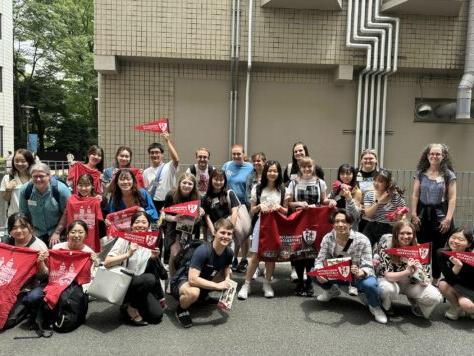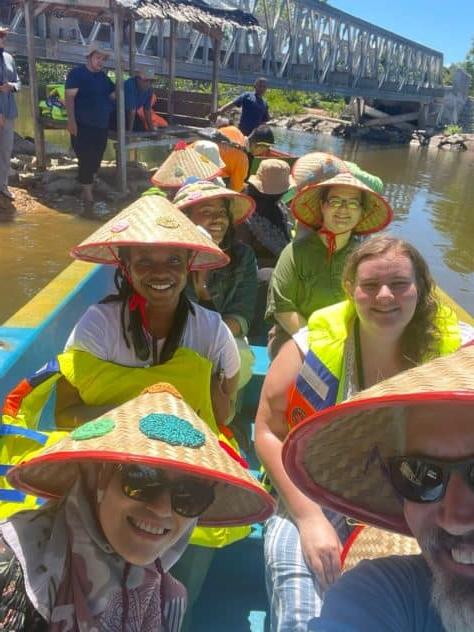Fifteen Washington & Jefferson College (W&J) students traveled to regions of Asia this past summer as part of the Luce Initiative on Asian Studies and the Environment (LIASE) Grant Program.
The participating students spent 14 days abroad – 11 students traveled to Japan, while four others traveled to Indonesia.
Before their trip, the selected students participated in a semester-long, one-credit course examining the two countries’ history, culture and environment. The course was taught by W&J faculty members who served as team leaders for the respective trips and by Asian Studies experts outside the College.
“We began this grant work in 2016, and while travel to China/Indonesia/Japan has been a vital component of our efforts, the curriculum we have built around Asian-Environmental Studies at the College and the durable relationships we have built with collaborators in these countries, will ensure long-term sustainability which the grantor expects,” said Dr. Robert East, associate professor and director of Environmental Studies Program and an original principal investigator of the grant.
The following students participated in the two trips.
Indonesia:
- Tanya Banks, senior psychology major
- Jillian Curtis ’23
- Naomi Shemory, senior international studies major and Russian studies, creative writing and Asian studies minor
- Jordyn White, senior political science and international studies major
Japan:
- Kourtney Byers, sophomore environmental science and computing & information studies major
- Paul Collier ’23
- Theresa DeVincentis ’23
- Felicia Filippini, junior environmental studies major and gender & women’s studies and studio art minor
- Isabella Fiore, sophomore undeclared major
- Natalie Ford, junior environmental studies and public policy major and nonprofit management minor
- Maxwell Jackman, sophomore undeclared major
- Kyleigh Jester ’23
- Caden Kim, sophomore biochemistry major
- Carmen Loner
- Three Tiger, sophomore undeclared major
Both trips aimed to study the intersectionality of culture and the natural and human-built environments, which provided students with many once-in-a-lifetime experiences among the villages, towns, cities and landscapes within Indonesia and Japan.
Zoom In: Indonesia
For the Indonesia trip, the faculty trip leaders were Dr. East; Dr. Zheya Gai, professor of political science and international studies; and Dr. James March, associate professor of biology.
Dr. Gai described the trip as unique in many ways and shared her appreciation for the people they met during their journey and how proud she was of the W&J students.
“The expertise and professionalism of our hosts, especially the many young female professionals and students, were most impressive,” said Dr. Gai. “[And our students] immersed themselves eagerly and sincerely. They made excellent contributions to the academic exchanges we had with our hosts.”
Among the many experiences on the islands of Java and Sumatra, the group toured the site of the historical 1955 Bandung Afro-Asian Conference, interacted with endangered Sumatran elephants, camped in a montane rainforest, interviewed operators of an oil palm plantation, assessed mangrove conservation efforts and toured the National Tsunami Museum commemorating the 2004 tragedy in Banda-Aceh.
Jordyn White, looking to pursue a career as a U.S. diplomat, enjoyed connecting with people in different parts of the world and experiencing their way of life.
“Gaining a global perspective as a W&J student has always been encouraged because it enriches the fundamental characteristics our institution stands on, such as connectivity, respect, empathy and inclusion,” White shared. “This experience taught me so much and gave me a greater appreciation for the value of culture.”
Regardless of their focus area or academic background, all students walked away with an appreciation for the trip’s events.
“From the moment I stepped foot in the airport to depart, to the final goodbye after two weeks…I was broadening my horizons every second,” said Jillian Curtis. “The trip was life-changing and perspective-altering.”
“Immersive experiences such as this trip can help students practice their interdisciplinary thinking, communication and cross-cultural collaboration skills. These skills, combined with the increased confidence that these experiences provide, will further prepare our students to make a positive impact in the world,” added Dr. March.
Zoom In: Japan
Students on the Japan trip were led by Dr. Nobunaka Matsuno, professor of chemistry; Dr. Jennifer Logan-Bayline, professor of chemistry; Dr. Elizabeth Bennett, professor and chair of psychology; and Dr. Han Ye, associate professor of Chinese.
“The trip to Japan was a profound opportunity for our students to enrich their language skills and expand their cultural horizons,” said Dr. Han. “I was thrilled to witness the proactive engagement of our students during the trip. These moments were a testament to their adaptability and willingness to step out of their comfort zones.”
Paul Collier was able to connect prior learning about the relationship between environmental stewardship and the systemic influence of Shinto and Pure Land Buddhism in Japan.
“As these are collectivist traditions that revere the natural world, upon traveling to Japan, I was able to witness and investigate the way these religions influenced Japan’s measures to protect the environment,” he shared.
Collier also realized, “The fight for environmental protection will not only be won by policy and lobbying but by a true philosophical and moral shift towards valuing the natural world.”
Overall, the group enjoyed many unique experiences centered around Japanese culture and their societal respect for and love of nature. Natalie Ford made this observation through experiencing Japan’s cities and various shrines.
“This was clear to me when seeing various shrines as there are many elements embedded to connect the spirit with nature. Their respect for nature was also seen in the pristine cities in Japan,” she shared.
Kourtney Byers also noted the Japanese culture of preservation.
“This was a drastic difference from U.S. cities that I have been to, and the cleanliness of the streets demonstrated how highly the people of Japan value their surroundings,” Byers said. “This experience has formed a bridge for me to better understand how other countries handle environmental issues and preserve the natural environment.”
Three Tiger agreed with Byers, noting Japan’s “impressive technological advancements and commitment to environmental preservation.”
“This eye-opening trip has equipped me with knowledge on how to protect the environment, and I am eager to apply it to my lifestyle,” Tiger reflected.
The Bottom Line
As takeaways for all students involved in the grant, Dr. Gai shared, “I believe that this trip opened a new world to them and enabled them to imagine new and more exciting paths in their lives.”
Students recently presented highlights of their research topic and travel experience during the annual LIASE Symposium on campus Tuesday, Sept. 19.
“Post-trip discussions in classrooms and other settings have convinced me that these students now better understand what it means to be a global citizen and realize the possibilities for professionally contributing to addressing global environmental challenges,” added Dr. East.
The LIASE Program, funded by the Henry Luce Foundation, aims to support integrated, innovative projects and programs that promote Asian Studies within the context of Environmental Studies. Following successful completion of a one-year exploratory grant, W&J’s four-year implementation grant capitalized on the unique faculty strengths, programmatic interests, needs and priorities of the College.
For more information, contact Dr. East at reast@91src.com or 724-503-1001, extension 3358.
About the Henry Luce Foundation
The Henry Luce Foundation seeks to enrich public discourse by promoting innovative scholarship, cultivating new leaders, and fostering international understanding. Established in 1936 by Henry R. Luce, the co-founder and editor-in-chief of Time, Inc., the Luce Foundation advances its mission through grantmaking and leadership programs in the fields of Asia, higher education, religion and theology, art, and public policy.
About Washington & Jefferson College
Washington & Jefferson College, located in the Pittsburgh suburb of Washington, Pennsylvania, is a historic liberal arts college founded in 1781 that values ethical leadership, professional readiness and inclusive communities. Our highly customized and intellectually engaging student experience develops professionals of uncommon integrity to lead in an ever-changing world. For more information about W&J, visit njz.91src.com or call 888-W-AND-J.















